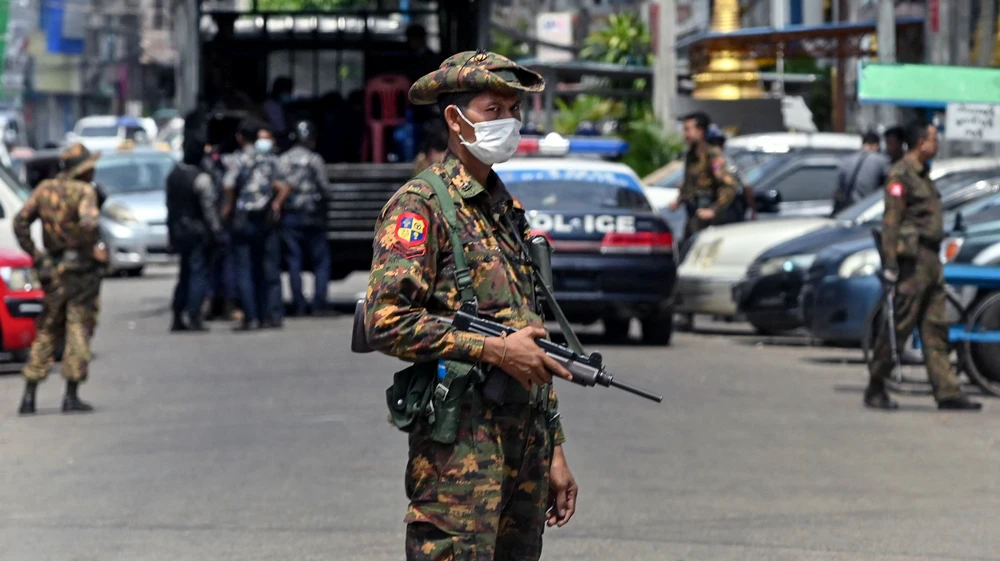Coverage of SAC-M’s report Fatal Business: Supplying the Myanmar Military’s Weapon Production in Vice News.
Despite international sanctions, Myanmar has been ratcheting up its weapons industry. It’s all happening through a shady international supply chain, where even nations who have condemned the deadly junta could be contributing to the war, according to a new report.
Written by the Special Advisory Council for Myanmar (SAC-M), the report released on Monday, titled Fatal Business: Supplying the Myanmar Military’s Weapon Production, says local arms production has burgeoned into a “sprawling” and “multi-faceted” industry in the face of decades of international sanctions aimed at stemming exactly that.
“Much of the focus in the past has been cutting the arms supply to the Myanmar military from outside by imposing sanctions on trade in weapons themselves,” Chris Sidoti, founding member of the SAC-M and one of the report’s authors, told VICE World News. “[The report] focuses in-depth for the first time on local arms productions rather than international arms trade.”
According to the SAC-M report, Myanmar’s extensive weapons production network is supported by foreign companies domiciled in Austria, France, China, Singapore, India, Israel, Ukraine, Germany, Taiwan, Japan, Russia, South Korea and the U.S. These companies have either directly or indirectly contributed to Myanmar’s arms industry through the supply of raw materials, equipment parts, technology, and maintenance.
These findings come after the junta was slapped with fresh sanctions after the coup on Feb. 1, 2021, which saw military leaders seize power from Aung San Suu Kyi’s democratically elected government. Since then, activists estimate that military forces have detained more than 17,000 people and killed at least 2,700, as military-led bloodshed continues in parts of the country.
In December 2021, government troops brutally killed at least 35 people in eastern Myanmar’s Kayah State, including two staff members of international non-profit Save the Children. Barely a year later, in October, the military launched an airstrike at a music concert in the northern Kachin State, killing around 80 people who were celebrating the anniversary of an ethnic political group.
Even with the sanctions, the domestic arms industry has shown no signs of abating, said Sidoti. Now, the junta is “largely self-sufficient in manufacturing a range of weapons,” from assault rifles to machine guns, anti-tank weapons, missiles, and landmines, the report highlighted.
Although the junta is able to manufacture some weapons, it remains reliant on overseas supply chains to produce and maintain its equipment. The country’s weapons factories, locally known as “KaPaSa,” currently operate machines made in countries like Austria, Germany, Japan, Taiwan, and the U.S., the report says.
Machines manufactured by the Austrian company, GFM Steyr, and currently in use at KaPaSa factories, are reportedly shipped from Myanmar to Taiwan, where they are serviced by GFM Steyr’s technicians.
Rights groups have expressed concern about Myanmar’s arms capabilities. Just weeks after the 2021 coup, over one hundred global organizations signed a joint letter calling on the UN Security Council to impose an arms embargo on Myanmar. However, it appears that regular arms embargoes may no longer be enough to curb the junta’s arms capabilities.
Phil Robertson, the deputy director of Human Rights Watch’s Asia Division, told VICE World News that the report is “a wake up call to the international community on the weakness of their sanctions against Myanmar.”
“Every single exposé like this one points to the incontrovertible fact that the international community has not gotten serious about sanctioning the Myanmar military in ways that will really impair their ability to violate the rights of the Burmese people,” he said.
In September last year, a report from the UN High Commissioner for Human Rights urged governments to block the Myanmar military’s access to arms, warning that there are foreign companies with ties with military-owned businesses in Myanmar across different sectors. The SAC-M report identified at least 40 foreign companies that are currently involved in Myanmar’s weapons production.
SAC-M has not found evidence that foreign governments are knowingly allowing these business transactions, Sidoti said, adding that the junta’s procurement of equipment and materials is often disguised by intermediary companies acting on their behalf.
“But given the conduct of the military, and particularly given the military’s domination of so many parts of life in Myanmar, there has to be a high level of suspicion that any dealing with these intermediaries, who are so close to the military, will be of benefit to the military,” he said. “I can’t accept there is total ignorance of this.”


